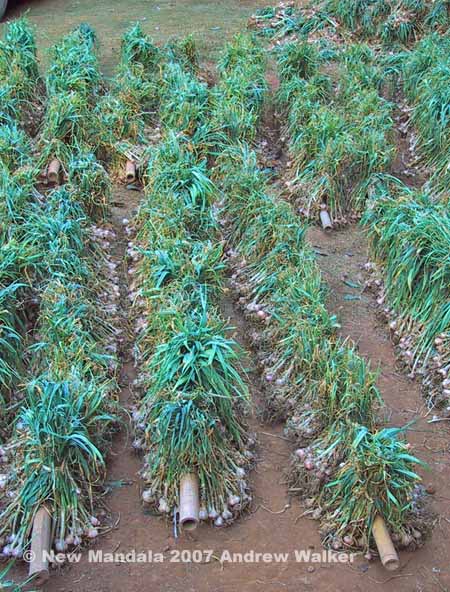Last week I wrote about the adoption of contract farming by farmers in northern Thailand. In the village where I have been working since late 2002 one of the reasons for this adoption is the decline in garlic cultivation. Problems faced by garlic farmers are complex and they include environmental, agronomic, economic and political factors. Here is a brief extract from a paper I am currently working on that outlines some of the environmental and agronomic problems:
Garlic production in the 2003 dry season was widely reported to be a failure, with almost all farmers consulted indicating that they had lost money on their crop: “the heads were small, the leaves were short and the crop developed slowly” one farmer lamented as he explained his 10,000 baht loss. “The heads are this big”, a more cheerful farmer joked, holding his hand as if grasping an enormous garlic head. “But that’s five heads” he added, pointing to each finger in turn to show that the heads were actually little bigger than a fingertip. When surveyed later, farmers indicated that yields on over 70 percent of plots were “poor” or “very poor.” Only one plot was described as returning a “very good” yield with only two others rated “good.”
Farmers explained the failure of the garlic crop in various ways. One key reason was climatic variability. Farmers in Baan Tiam have a strong perception that the weather is now departing from its usual patterns. One farmer, Maew, told me that in the past the weather used to be good for agriculture but now it was too unreliable. “One minute it’s cold, then it’s raining and then it’s hot,” she explained. “And now hot means very hot, cold is very cold and wet is very wet.” Somkit, another garlic farmer, had a different version of climate change. He said that 10 or 20 years ago it used to be cool in Baan Tiam, not like in Chiang Mai, where it was unpleasantly hot. “But now,” he said, “it is hot here too, just like the city.” Now the cooler weather that was good for garlic could not be relied upon. “Perhaps it is because the forest is all gone.” Concerns about climatic unreliability were compounded by the unseasonable rainfall in late December 2003. This, very unusual, dry-season rainfall had resulted in the flooding of low-lying areas of the paddy fields – flattening the garlic and resulting in negligible yield on the most waterlogged sections. Even in the fields above the clearly visible flood line farmers felt that the excessive moisture, combined with unusually warm weather, had reduced yields.
These concerns about unreliable climate were combined with even more potent concerns about the state of Baan Tiam’s soil. By the time the garlic crop was harvested, poor soil fertility–rather than excess rain earlier in the season–had emerged as the main talking point. The emerging consensus was that the soil was no good, probably as a result of excessive chemical use over the years and lack of input of natural manure. The relatively long history of intensive garlic production in Baan Tiam–with increasingly heavy inputs of fertiliser, herbicide and pesticide–meant that the paddy soil was now spoilt. The presence of an unknown small red soil mite in some of the plots was, for some, a disconcerting sign of the soil’s decline. Further to the west, in Chedi Saay district, yields were still good, but they had only been growing garlic (and using chemicals intensively) for four or five years. As a result of the decline of this basic resource in Baan Tiam, one farmer commented, the agricultural prospects for the village were very bad, the farmers would have to make do with a “sufficiency economy” (setthakhit phoo piang).
Another key factor was the impact of the Thaksin government’s trade agreement with China whereby tariffs were listed on a wide range of agricultural products. This trade agreement has been widely blamed for destroying the livelihoods of garlic farmers in Thailand. In Baan Tiam it certainly had a short-term impact, but the medium term impact of the Thailand-China trade agreement has been much less than commonly reported. I will examine this issue in a later post.
 Facebook
Facebook  Twitter
Twitter  Soundcloud
Soundcloud  Youtube
Youtube  Rss
Rss 